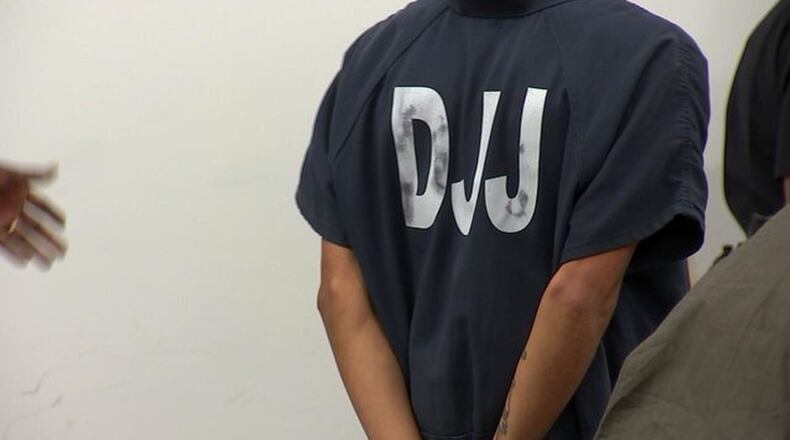The state’s long-term juvenile detention centers are so short-staffed that three of them routinely operate with less than 60 percent of their security officers, Georgia Department of Juvenile Justice records show.
These severe shortages are taking place even as the number of minors in custody has dropped, lowering the Georgia Department of Juvenile Justice's staffing needs. Experts say that the vacancy levels risk the safety and rehabilitation of children and undermines the state's nationally recognized juvenile justice reforms.
“Children are less safe,” said Atteeyah Hollie, a senior attorney with the Southern Center for Human Rights. “They are less able to complete their sentences in a rehabilitative manner when there aren’t guards to protect them.”
At six of the state’s seven long-term youth detention centers, or YDCs, the shortage of juvenile corrections officers has only grown worse this year, according to weekly staffing reports obtained by The Atlanta Journal-Constitution through an open records request.
The average weekly security staffing level at Eastman YDC southeast of Macon is 10 percentage points lower than in 2017, according to an AJC analysis. It operated with only 43 percent of its 191 security positions filled for one week in February. Augusta YDC operated with only 44 percent of its officers for one week in March.
Officers routinely work past their 12 hour shifts because staffing is so low, the reports state.
In a written statement, DJJ officials said that Georgia’s strong economy has made keeping qualified correction officers challenging. It is currently trying to streamline its hiring processes and get feedback from employees on how to improve workplace conditions.
“DJJ remains committed to our employees and will continue to seek qualified candidates who are willing to work with the youth population that we serve,” the statement said.
Longer stays, delayed treatment
Staffing problems harm the state’s ability to rehabilitate youths, especially sex offenders, experts say. More of them are shunted into the department’s short-term rehabilitation centers where there is no sex offender treatment, which can be required by a court as a condition for release, said Melissa Carter, executive director of the Barton Child Law and Policy Center, whose attorneys represent children in the state’s juvenile justice system.
A child may be forced to stay in detention up to a year longer than than his original sentence because it takes so long to be transferred to long-term facilities where sex offender treatment is available, Carter said. This can stunt rehabilitation, which is often more successful if a child remains in contact with his community. Staffing shortages also force the transfer of some youths hundreds of miles from their homes.
“When we’re not able to put the child’s needs ahead of organizational needs, we’re compromising the principles of juvenile justice reform,” Carter said.
Even some of the better staffed long-term detention centers are struggling. Milledgeville YDC operates with an average of 64 percent of its security positions filled, 10 percentage points lower than in 2017.
Job vacancies and turnover are a chronic problem in the juvenile justice system nationally, where tough conditions and low pay are common. In Texas, where salaries for juvenile corrections officers lag thousands of dollars behind those for adult prisons, employees said staff shortages were behind guard misconduct scandals. In Maine, an independent assessment said shortages caused “dangerous and harmful conditions.”
It’s hard to find candidates qualified to fill these posts. Many juvenile facilities are located in rural areas near adult prisons that snap up much of the qualified workforce.
“It’s difficult work. It can be dangerous work,” Carter said. “We’re talking about confined settings. And where these facilities exist, we may have drained the workforce that is there.”
Turnover rising, not falling
High vacancy rates has been blamed for serious problems in Georgia as well. A 2014 state Department of Audits and Accounts review concluded that the DJJ's nearly 50 percent turnover rate may contribute to staff misconduct, a possible allusion to a federal report that named four of the state's lockups as among the nation's highest in reports of inappropriate sexual contact with detention officers.
The DJJ has since won national recognition for its reforms, but high job vacancy rates continued to haunt the agency. The 2015 death by suicide of a 14-year old detained at DeKalb Regional YDC was blamed on understaffing, according to news reports.
More recruitment efforts and a small pay increase have not staunched the bleeding. The state Department of Juvenile Justice made turnover one of its top priorities by aiming to reduce turnover rates from 42 percent by fiscal year 2017, but it jumped instead.
Essential functions at these long-term centers, such as moving youths to mental health treatment or medical care, have become more difficult, the weekly staffing reports state. The shortages even impact basic sanitation operations.
Future juvenile justice reforms are at stake, Carter said. Georgia is one of only four states that places 17-year-olds in adult prisons for certain less serious crimes, a practice that criminal justice reformers say harms youth. A DJJ spokesman has said publicly that the agency would like to place them in juvenile facilities, but it lacks staff to care for them, she said.
About the Author
Keep Reading
The Latest
Featured

